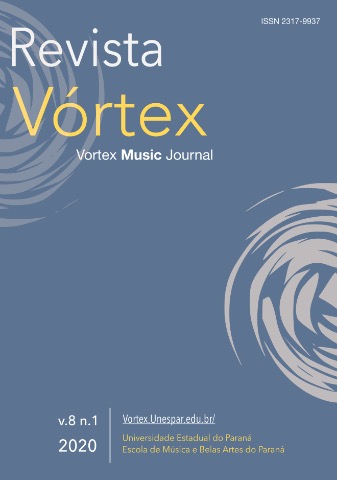In the Era of Computers, Internet and Multimedia, are we still Teaching Composers to become Chapel-Masters?
DOI:
https://doi.org/10.33871/23179937.2020.8.1.1-14Resumen
The ongoing paradigm shift from traditional methods of teaching music composition towards new approaches based on computer technology for sound production is the main focus of the article. The paper reviews the evolution of teaching methods throughout the Classical, Romantic and Modern periods, demonstrating how certain standard practices from former ages, based on the professional profile of the Chapel-Master, become theoretical golden principles for subsequent periods. After the French Revolution the traditional method of individual practical exchange between master and disciple was upgraded at the Conservatory. Classes for groups of students required a new approach based on theory abstraction. Although none of these teaching methods have been abandoned up today, a new paradigm appears when the tools of computer technology became widespread. An unpredictable equilibrium between the traditional methods and the new techniques of computer-assisted or computer-generated music composition tends to emerge.
Descargas
Citas
ARNOLD, J. R. Grétry's Operas and the French Public: From the Old regime to the Restoration. Abingdon: Routledge/Ashgate, 2016.
BARAGWANATH, Nicholas. The Italian Traditions & Puccini: Compositional Theory and Practice in Nineteenth Opera. Bloomington: Indiana University Press. 2011.
ROIG-FRANCOLI, Miguel. Harmony in Context. New York: McGraw-Hill. 2013.
SCHUMANN, Robert. A Symphony by Berlioz. Neue Zeitschrift für Musik. Six instalments, between July 3 and August 14, 1835.
SCHUSTER-CRAIG, John. Schumann Encounters Berlioz: The Symphonie fantastique and Schumann's String Quartets, Op. 41. Faculty Scholarly Dissemination Grants, 2010. Retrieved from: <https://scholarworks.gvsu.edu/fsdg/105>. Accessed on: 31 jan. 2020.
Descargas
Publicado
Cómo citar
Número
Sección
Licencia
Derechos de autor 2021 Vortex Music Journal

Esta obra está bajo una licencia internacional Creative Commons Atribución 4.0.
Los autores conservan los derechos de autor y conceden a la revista el derecho de primera publicación, con el trabajo simultáneamente bajo la licencia Creative Commons Attribution Licence que permite compartir el trabajo con reconocimiento de autoría y publicación inicial en esta revista.






